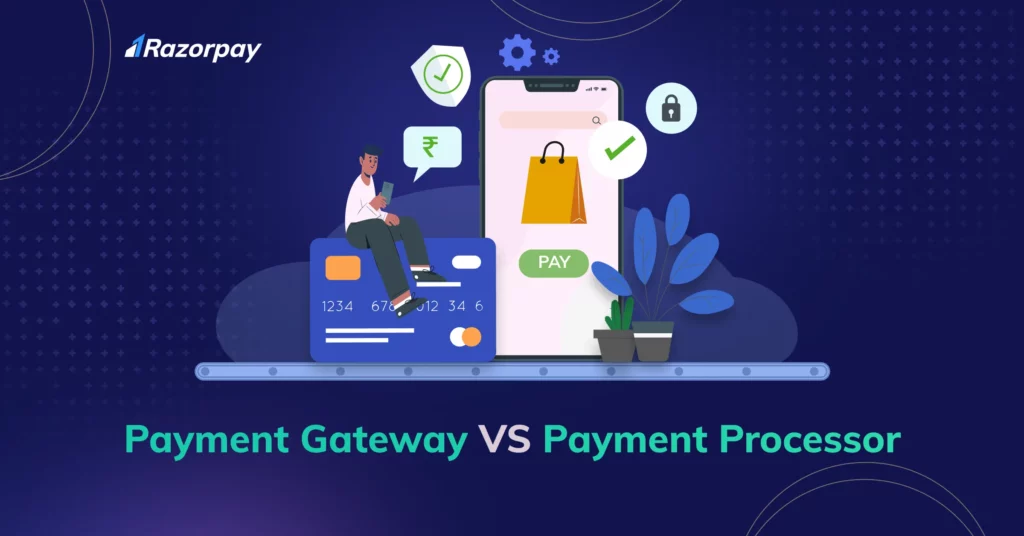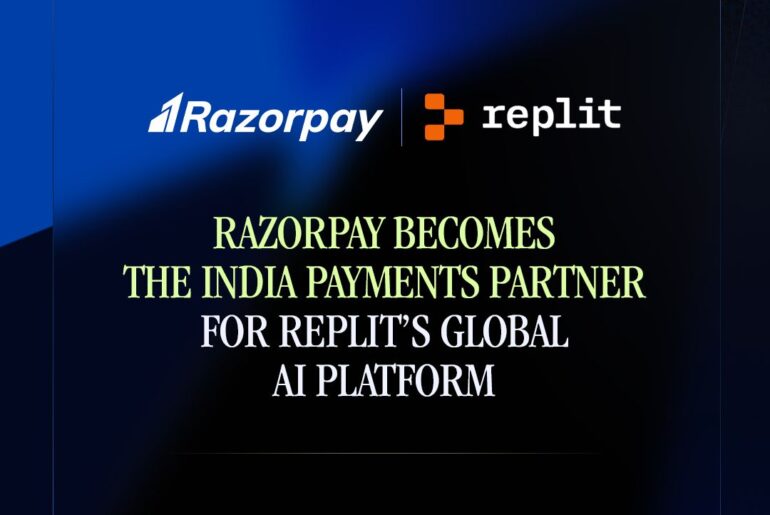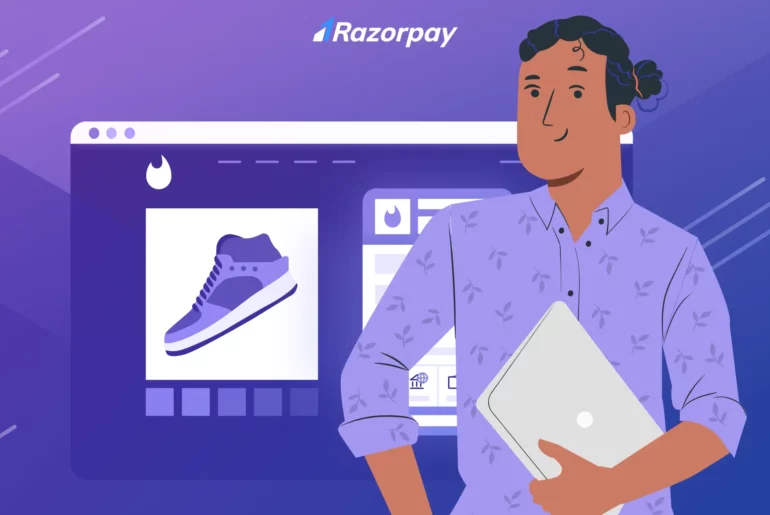As a payment method, digital payments have become the ‘new normal’ for the majority of people. While sending and receiving payments online has become a part of life in the digital age, businesses are actively looking for ways to simplify seamless payments by utilising a variety of digital payment solutions that boost customer satisfaction through seamless checkout.
If you want to increase your revenue in the future, you must offer a variety of digital payment methods to potential clients. When looking for such payment solutions, you will come across two terms: payment processors and payment gateways. What are they, and how do we distinguish them? Let’s get started!
Table of Contents
What is a Payment Gateway?
A payment gateway is the simplest way for a company to receive digital or online payments via its website or app. It is a platform that connects your bank account to the platform where you need to transfer money.
A payment gateway authorises you to conduct an online transaction through different payment modes like net banking, credit card, debit card, UPI, or the many online wallets that are available these days. It plays the role of a third party that securely transfers your money from the bank account to the merchant’s payment portal.
Related Read: Explore in detail about types of payment gateway.
What is a Payment Processor?
A payment processor is a payment system that manages your customers’ transactions and allows them to purchase your goods and services. It acts as a go-between for the cardholder, merchant, acquiring bank, and issuing bank.
It is a system commonly used by a merchants that executes online transactions with customers from various channels such as credit cards and debit cards or bank accounts.
When an online purchase is made, the payment gateway transfers the transaction data and provides the approval or decline information for the payment based on various parameters. However, it does not deal with the processing of the payment itself, that is where the payment processor comes in.
Related Read: What is a Payment Processor & How Does It Work?
Payment Gateway vs Payment Processor: A Deep Dive
A payment gateway is a network that collects, verifies and performs fraud checks on customer’s credit card information before sending it to the payment processor.
A payment processor is a service that routes a customer’s credit card information between the customer’s bank and the merchant bank.
Here are the main differences between a payment gateway and a payment processor based on various parameters:
|
Payment Gateway |
Payment Processor |
|
|
How it works |
Collects, encrypts and verifies credit card information |
Communicates between the cardholder, merchant, acquiring bank, and issuing bank. |
|
Definition |
Payment gateway approves or declines transactions between the website and the customer. |
Payment processor is responsible for fund transfer by communicating between the merchant, the issuing bank, and the acquiring bank. |
|
How to Choose |
The PG offers different payment modes. | The PP ensures PCI compliance, software compatibility, and fraud prevention. |
|
Use |
Acts as a terminal for card validation and fraud prevention |
Acts as mediator between merchants and financial institutions to facilitate credit card transactions. |
|
Best Suited For |
E-commerce store and card-not-present (CNP) transactions |
POS and In-person transactions |
|
Does it Facilitate Payment |
No, it communicates the status of transactions. |
Yes, it facilitates payments. |
Related Read: What is a Merchant Account: All You Need to Know
Constituents of Electronic Payment
In the payment process, various parties come together to ensure a smooth and secure transaction:
-
Customer: Initiates the payment by providing payment information like credit card, UPI or bank details.
-
Payment Gateway: Acts as the intermediary, encrypting the customer’s data and authorising the transaction.
-
Acquiring Bank (Merchant’s Bank): Receives the authorised transaction and processes it for settlement.
-
Card Networks (e.g., Visa, MasterCard): Facilitate the transfer of funds between the acquiring bank and the customer’s issuing bank.
-
Issuing Bank (Customer’s Bank): Verifies the customer’s payment information and ensures there are sufficient funds for the transaction.
A payment gateway authorises an online payment through different payment methods like credit cards, debit cards, net banking, UPI, etc. It follows encryption technology called Secure Socket Layer (SSL) for a safe and secure transfer of funds. The security of data is taken care of by the payment gateway.
The payment processor is responsible for making the payment reach your bank account, acting as a communication intermediary.
Related Read: What Is a High-Risk Merchant Account? Factors to Determine High-Risk Merchant Account
How Does a Payment Gateway Function?
When you click ‘Buy Now,’ the Payment Gateway steps into action with the following steps:
-
Data Encryption: The payment gateway’s first task is to turn your payment details (like card numbers and CVV) into an indecipherable code. This keeps your info safe during the online journey.
-
Secure Connection: The payment gateway creates a secure connection (usually with that familiar HTTPS) between your online store and your bank.
-
Authorisation Request: Once your info reaches the Payment Gateway, it sends an authorisation request to your issuing bank.
-
Bank Approval: Your bank reviews the request and checks your account. If your info is validated, it sends an ‘approved’ signal back to the Payment Gateway.
-
Transaction Complete: With the bank’s green light, your payment goes through, and you receive that joyful ‘Transaction Successful’ message
Read in detail about how payment gateway works.
When to Use a Payment Gateway?
As a business owner, it becomes necessary for you to use a payment gateway if you are accepting payments through following means
-
E-commerce Stores: If you run an online store, a payment gateway is a must-have. It enables secure and convenient transactions, fostering trust with your customers.
-
Small Businesses: Small businesses can benefit from payment gateways too, especially if they operate online or want to accept digital payments in-store.
-
Subscription Services: For businesses offering subscription-based services, Payment Gateways simplify recurring billing, ensuring hassle-free payments from customers.
-
Donations and Fundraising: Nonprofits and charities can utilise Payment Gateway to facilitate online donations. This widens their reach and makes contributions more accessible.
Related Read: What Is Mass Payment And How Does It Work?
How Does a Payment Processor Function?
A payment processor is a system that handles online transactions. They serve as a go-between for the merchant and the financial institutions concerned. Here’s the lowdown on how payment processors work:
-
Transaction Initiation: The payment processor starts functioning when you have filled your cart, and clicked the payment tab.
-
Merchant to Processor: The merchant (the online store) sends your payment details, including the purchase amount and your card information, to the payment processor.
-
Processor to Bank: Next, the payment processor communicates with your card-issuing bank, enquiring whether you have sufficient funds for the purchase.
-
Bank Confirmation: Your bank reviews the request and checks your account. If there is sufficient balance, it sends back an ‘approved’ signal.
-
Transaction Complete: The payment processor now tells the merchant, “Good to go!” and the purchase is complete. You get your order confirmation.
Related Read: What are the Different Types of POS Systems?
When to Use a Payment Processor?
A payment processor oversees the credit card transaction process by serving as an intermediary for the merchant and the financial institutions involved. A credit card processor can authorise credit card transactions and help merchants get paid on schedule by enabling the transfer of payments. Here’s when you should consider using a payment processor:
-
High Transaction Volume: If your business deals with a high volume of transactions, such as a busy retail store or an e-commerce giant, payment processors handle the heavy lifting efficiently.
-
Credit Card Payments: Payment processors excel at processing credit card payments. If your business relies heavily on credit card transactions, a payment processor is essential for quick and secure processing.
-
Point of Sale (POS) Systems: Businesses using POS systems, whether brick-and-mortar stores or food establishments, benefit from payment processors for speedy and accurate payment handling.
-
Global Expansion: When your business goes international, payment processors simplify the complexities of handling diverse currencies and payment methods, making global expansion smoother.
Related Read: How to Make Credit Card Payments Through NEFT?
Key Takeaways
The roles of Payment Gateways and Payment Processors are distinct but interconnected, each playing a crucial part in ensuring your financial transactions happen smoothly.
Payment Gateway is ideal for businesses that need a secure path for processing card payments, especially in e-commerce. Payment gateways focus on encrypting your payment details, making the online purchase process secure. They typically charge fees per transaction, which can vary based on your provider and plan.
Payment Processor is essential for businesses looking to process a high volume of transactions. It interacts with banks to ensure funds are available and facilitate the transfer. Payment processors often charge fees based on transaction volume, sometimes including a fixed fee per transaction.
If you’re an online store looking for secure online payments, start with a Payment Gateway. If you’re dealing with a high volume of transactions and need to process them efficiently, a Payment Processor might be your best bet.
Related Read: Payment Gateway vs Payment Aggregator
Frequently Asked Questions (FAQs)
1. How many payment processors are there?
There are numerous payment processors available worldwide, ranging from well-known giants like PayPal, Stripe, and Square to smaller, specialised options. The exact number can change as new companies enter the market.
2. What are the five types of payment processors?
Payment processors can be broadly categorised into five types: Traditional Merchant Account Providers, Payment Gateways, Aggregators, Mobile Wallets, and Cryptocurrency Payment Processors. Each serves distinct needs within the payment ecosystem.
3. Can a payment gateway function without a payment processor?
No, a Payment Gateway cannot function without a Payment Processor. Payment Gateways serve as a secure bridge between the merchant and the Payment Processor, transmitting transaction data to the Processor for authorisation and settlement.
4. What role do payment processors play in risk management?
Payment Processors play a critical role in risk management by assessing the validity of transactions and identifying potentially high-risk activities. They use security measures and algorithms to protect businesses from financial losses due to chargebacks and fraudulent transactions.
5. What is the difference between a payment gateway and a payment processor?
A payment gateway and a payment processor are both essential components of electronic payments, but they serve distinct roles.
A payment gateway acts as a secure bridge between the merchant’s website and the financial institutions, encrypting and transmitting payment data for authorisation.
On the other hand, a payment processor manages the behind-the-scenes operations of a transaction, liaising between the acquiring bank and the issuing bank, verifying the payment, and transferring funds.
In simple terms, the payment gateway facilitates secure data transmission, while the payment processor handles the technical and financial aspects of the transaction. Together, they ensure seamless and secure electronic payments.


